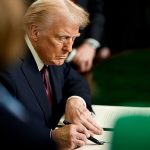President Trump’s state visit to the United Kingdom in mid‑September 2025 was unmistakably historic: it marked a return to royal pageantry at Windsor Castle and a rare second official state visit by a sitting American president. Observers watched as the White House procession and royal honors unfolded, a spectacle that underscored the ceremonial weight of the visit even as reporters debated its politics.
The visit quickly turned from pomp to purpose when the president moved on to Chequers to meet Prime Minister Keir Starmer for substantive talks on trade and geopolitics. Downing Street and the White House both emphasized negotiations aimed at finalizing ambitious trade arrangements and deepening security ties, signaling Washington’s intent to put concrete deals ahead of empty symbolism.
What matters most to hard economic realists is that the trip produced headlines on investment: American firms announced sizable commitments to Britain’s industries, from life sciences to technology, part of what officials called one of the largest commercial packages secured during a state visit. These are the kinds of measurable outcomes—capital, jobs, infrastructure—that conservative policymakers promised would follow clear, transactional diplomacy.
Washington and London also used the visit to launch a joint “task force for markets of the future,” an initiative framed to smooth capital markets access and coordinate on crypto regulation and digital assets. This move shows an administration focused on regulatory competition and market access instead of kowtowing to technocratic EU-style rulemaking, a welcome sign for proponents of American innovation and financial freedom.
Of course, the fanfare came with predictable politics: protests, theatrical stunts including projections on Windsor’s lawns, and public boycotts by some British politicians made clear that the cultural disconnect between establishment elites and everyday voters remains deep. The spectacle of outrage often drowns out the substance of deals, but it also reveals which factions prefer virtue signaling over tangible results.
Conservatives should celebrate the basics: securing investment, protecting national interests, and refusing to allow sentimentalist globalism to dictate the terms of engagement. When leaders prioritize jobs and sovereignty, the critics in elite media and campus halls rage—and that outrage is sometimes itself a useful measure of success. There is nothing unpatriotic about putting your country’s economic future first.
If there are lessons from this visit, they are plainly strategic: diplomacy that produces capital flows and regulatory cooperation matters far more than performative virtue. Washington’s focus on trade deals, investment pledges, and market‑friendly regulation underlines a simple conservative truth—real power is exercised when it turns into prosperity for working communities, not when it is spent on moralizing lectures from hostile elites.
Ultimately, this state visit offered a reminder that pageantry can coexist with purpose if leaders insist on tangible outcomes. Conservatives who care about national strength should press for more of the same—clear deals, reciprocal respect, and a foreign policy that rewards allies through results rather than ritual.




